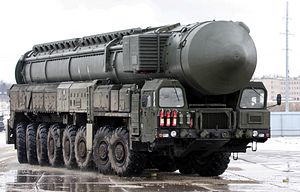Rent is always a hot topic, no less so in Kazakhstan, where Russia rents several sites for military purposes. Last month, members of the Kazakh parliament pushed the deputy defense minister on why Astana wasn’t making more money on renting sites to Russia. Moscow pays Astana $24 million per year for use of four sites: the Kapustin Yar test firing range, the Sary-Shagan and Emba missile testing sites, and the 929th State Test Flight Center.
Kazakh lawmakers–facing what is shaping up to be a prolonged economic slump–have been comparing what Russia pays Kazakhstan to what the United States pays Germany. The comparison might be unfair as the sites mentioned to be at the center of the debate are predominantly missile testing sites–whereas U.S. bases in Germany host thousands of soldiers.
Joshua Kucera reported for Eurasianet last month that this discussion was touched off by testimony given by Deputy Defense Minister Okas Saparov. Saparov faced questions from MPs about the rent but pushed back. As Kucera phrased it, Saparov “cautioned that it was early to try to renegotiate with Russia.”
There was a second trigger for this conversation too. Kazakhstan is earning less in 2016 than in previous years on rent from Russia for some of the sites. Per agreements signed last year between Russia and Kazakhstan, Moscow’s rent has decreased for at least two of the sites.
For example, the Sary-Shagan missile testing site, located near lake Balkhash was subject of a protocol signed last April that revised Russia’s rent. The site, according to the Nuclear Threat Initiative’s database of testing sites, was established in 1956, for testing anti-ballistic missile (ABM) systems fired from the Kapustin Yar ballistic missile test site–which spans the border between Russia’s Astrakhan Region and Kazakhstan’s Atyrau Region. In November 2015, TASS reported that Russia launched an RS-12M Topol (a mobile intercontinental ballistic missile) from Kapustin Yar. A Russian defense ministry spokesman said “The missile’s dummy warhead hit a hypothetical target at the Sary-Shagan proving ground, in neighboring Kazakhstan.”
Notices published to the Russian president’s website last month state that as of January 1, 2016, “the amount of rent paid yearly by Russia to Kazakhstan for the use of the testing range will decrease from $18.932 million to $16.276 million, due to the reduction in the testing range’s territory through the transfer to the Kazakhstani side of individual tracts of land not used by Russia’s Defense Ministry, which are suitable for seasonal agricultural and geological prospecting work without detriment to the use of the testing range for its intended purpose.”
The 929th State Test Flight Center is subject of a similar notice–its rent decreased from $4.45 million to $3.08 million for the same reason, a reduction in territory being leased. The Emba site, according to the Astana Times’ reporting of Saparov’s testimony, would be recovered entirely this year. “We have an agreement with Russia,” he said. “Our minister of defense has agreed to shut down one more site: Emba.”
The testing sites and other sites leased by Russia, like the Baikonur cosmodrome, are a mixed blessing for Kazakhstan. They are a source of income, in the form of rent or in-kind training, but also a source of tension and environmental damage. Baikonur–a busy and internationally critical spaceport–has been the focus of a growing environmentalist backlash. But it mostly comes down to the money: Kazakhstan wants the rent from these sites (and preferably more) and Russia is trying to trim its already-overstretched budgets. Kazakhstan agreed on an extension of the Baikonur lease to 2050, but many of the other sites will come up for renegotiation by 2020. Kazakhstan could be gearing up to push for more, but there aren’t other buyers to step in if Russia decides to walk away.
































